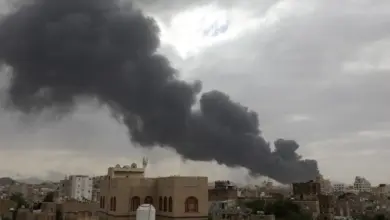Sanaa — A Gulf Arab plan presented in Sanaa on Thursday sees President Ali Abdullah Saleh handing over power within three months, an official said, in the latest effort to stop Yemen's descent into further violence and chaos.
Saleh's ruling party said it would respond within 24 hours, and aides to Saleh, who sounded defiant in a speech on Wednesday, said he seemed set to accept the initiative.
"We welcome this initiative and will deal with it positively," a government official told Reuters.
Gulf Arab and Western states, long-time backers of Saleh, want an orderly transition after three months of protests have brought his 32-year rule to the brink of collapse in a country where Al-Qaeda militants have re-established themselves.
Members of Yemen's opposition coalition, who met Gulf Cooperation Council Secretary General Abdullatif al-Zayani and say they are still studying the proposal, said they were wary of loopholes that could keep Saleh, a shrewd politician, in office.
The opposition leader, who asked not to be identified because the coalition has yet to give an official response, said Saleh could use his ruling party's parliamentary majority to avoid standing down. Under Yemeni law, two-thirds of the parliament must accept a president's resignation.
"There need to be guarantees…because the ruling party could reject his resignation, and then we would not get Saleh's departure," the opposition leader said.
A Yemeni government official told Reuters the revised GCC proposal would see Saleh announcing his resignation to parliament one month after signing an agreement, then hand over power to his vice president.
Saleh would also appoint an opposition leader to run a new cabinet that would pave the way for presidential elections two months later.
MAJOR STICKING POINTS
The proposal also envisages protesters winding down their activities and offers immunity to Saleh, his family and aides against prosecution, which street protesters have demanded. The opposition has given no clear view as to what it would accept.
According to the Gulf plan, 50 percent of the new unity cabinet would be comprised of members of the current ruling party, 40 percent from the opposition coalition, and 10 percent from other political groups.
The cabinet arrangement could potentially help Saleh supporters maintain a majority, as the 10 percent from other groups might include recently resigned ruling party members.
Ending protests would also be a major sticking point.
"That condition will be difficult to achieve," one opposition leader said. He said the opposition did not fully control the hundreds of thousands of people, many of them youth activists, who have taken to the streets.
Earlier in April, a similar GCC initiative proposed presidential powers be transferred to the vice president until an election. The opposition rejected it and Saleh, who officially accepted that proposal, continued to give mixed signals on his readiness to step down.
On Wednesday he vowed to stand firm amid "conspiracies and coups."
"Those who want power or to gain the seat of power should do so through the ballot box," he said. "Change and departure will be through voting via the legal framework of the constitution."
Saleh has said he would not seek reelection when his term ends in 2013, and later vowed to stand down this year after organizing parliamentary and presidential elections.
But the opposition and protesters have little faith in his promises and want him to quit first.
"This speech (by Saleh) is to raise spirits, but it's no longer logical because the people have had their say — they say an immediate departure is necessary," said Sultan al-Atwani, the leader of Yemen's Nasserist party, part of the opposition.
TALKS DRAG, VIOLENCE FLARES
Yemeni officials expect a visit on Saturday from United Arab Emirates foreign minister Sheikh Abdullah bin Zayed al-Nahayan, though opposition figures said it was not clear if they would meet him.
As rounds of negotiations drag on, violence has flared. Protesters tested security forces' limits by marching past the defense and other ministries in Sanaa on Wednesday and burning tires in the streets of Taiz, south of the capital.
The death toll has been rising. Six people died from their wounds when police opened fire at protests in Sanaa and Taiz on Tuesday, bringing the number of demonstrators killed to 123.
The potential for fractious Yemen to further descend into chaos and bloodshed has been a concern for Washington and neighboring Saudi Arabia, the world's biggest oil producer.
Saleh has warned of chaos if he is forced out of office, suggesting there could be civil war and militants could benefit.
But the opposition, which includes the Islamist Islah party, says it could do better at maintaining control and accuses Saleh of making deals with militant groups in the past.



